Uncategorized
Andrew Cuomo said antisemitism was his ‘most important issue.’ What does his record say?
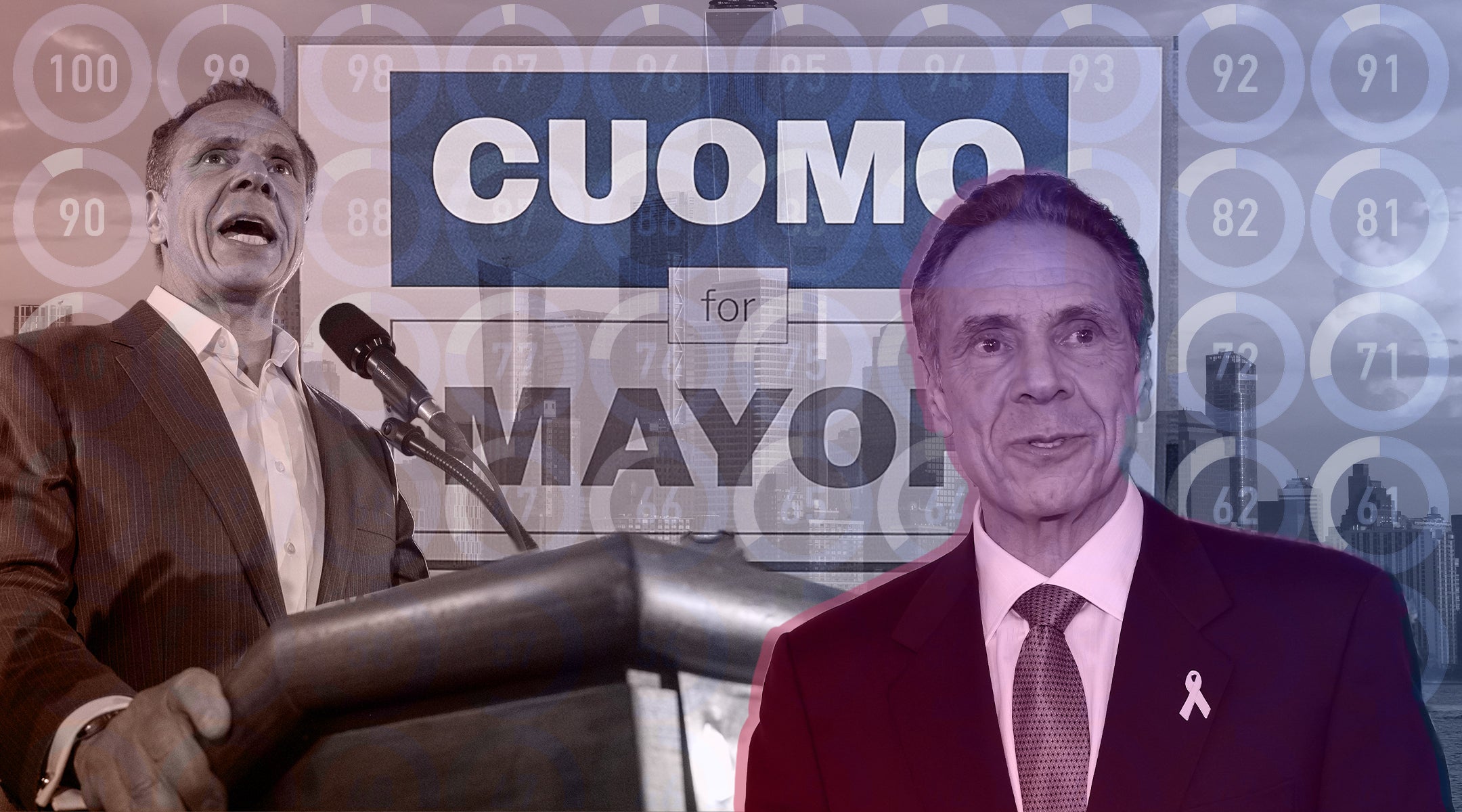
At an Upper West Side synagogue in April, Andrew Cuomo pronounced “the most important issue” in his campaign for mayor of New York City: antisemitism.
The former governor has centered an appeal to Jewish New Yorkers as he seeks to defeat the race’s frontrunner, Assemblyman Zohran Mamdani, a staunch critic of Israel. In the same speech at the West Side Institutional Synagogue, Cuomo declared a belief that has defined his attitude toward Israel and antisemitism for decades.
“It’s very simple,” he said. “Anti-Zionism is antisemitism.”
Cuomo proceeded to lose the Democratic primary to Mamdani and relaunch his campaign as an independent in the general election. Now polling second but far behind Mamdani, he contends that his vow to defend Jews lies at the heart of his bid to lead the city with the largest Jewish population in the world. He himself has two Jewish brother-in-laws and a Jewish son-in-law who joined his family last year.
Here is a breakdown of Cuomo’s history, rhetoric and policies surrounding Jews, Israel and antisemitism.
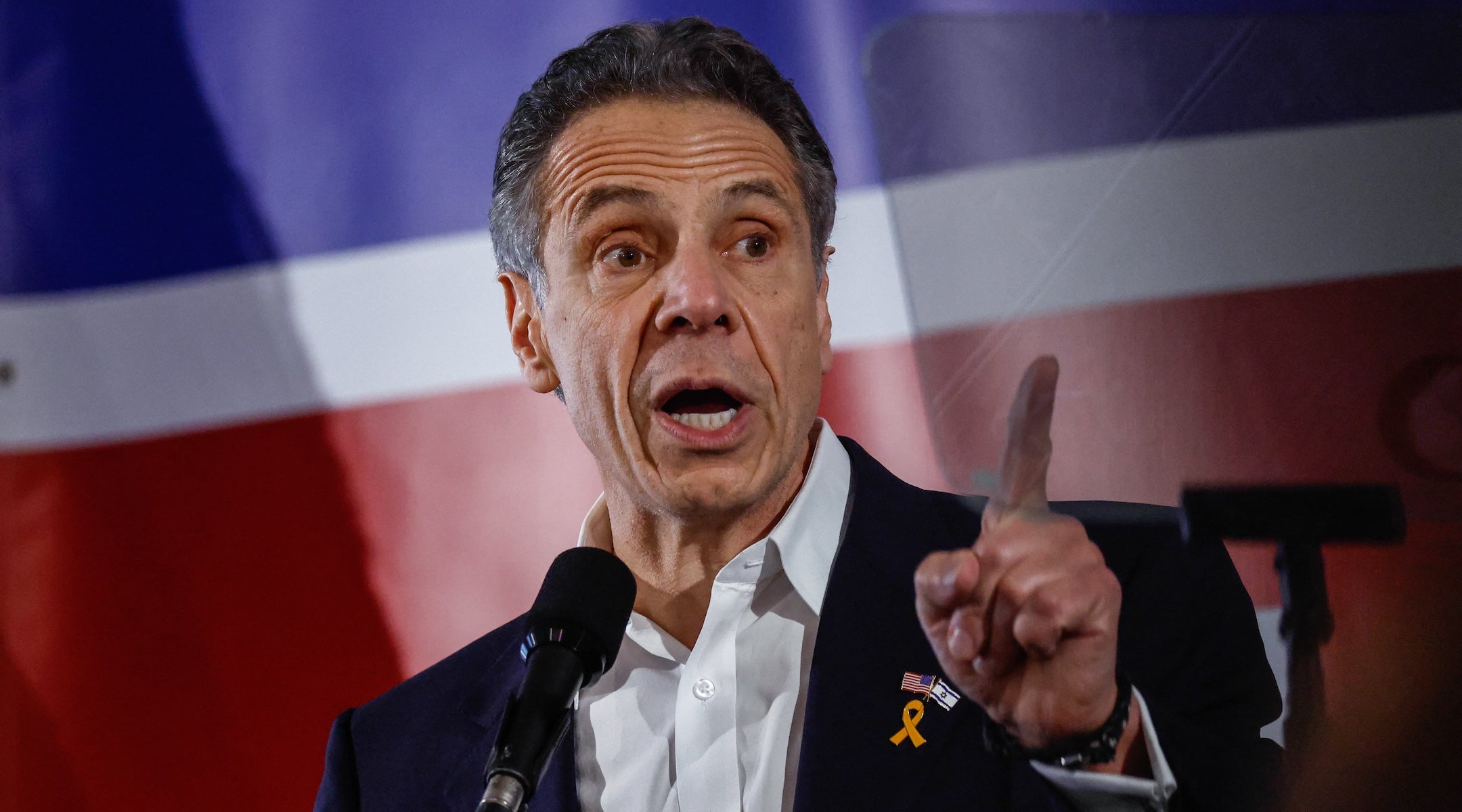
(Kena Betancur / AFP via Getty Images)
Tackling antisemitism
Cuomo has long touted deep ties to Jewish New Yorkers. In a 2002 interview with New York Jewish Week, he described being “raised in a community in Queens with Jewish people,” and he often references his Jewish in-laws.
While he was governor from 2011 to 2021, New York saw a string of attacks on Jews. In 2019 alone, those included assaults on Orthodox Jews in Brooklyn, the stabbing of five people at a rabbi’s house in Monsey, and a shooting that killed four people at a kosher supermarket just over the border in Jersey City.
Cuomo responded with several public measures. He formed a hate crimes unit in the state police, allocated $45 million to protect religious-based institutions and upped policing in Jewish neighborhoods. In 2020, he passed a law that made New York the first state to define “hate-fueled” murder as domestic terrorism, punishable by up to life in prison without parole.
During his mayoral bid, Cuomo has honed in on fighting antisemitism, often in the same breath as calling himself a stalwart supporter of Israel and a pillar against pro-Palestinian activism. He warned the crowd at the West Side Institutional Synagogue, “The forces of antisemitism and pro-Palestinian policies are organized, well funded and mobilized, and have significant political strength, even right here in the city of New York.”
At the center of Cuomo’s pitch to Jewish voters is the alternative of Mamdani, whom he has accused of “fueling antisemitism.” Mamdani says that Israel is committing genocide in Gaza and supports a boycott against Israel. Cuomo says his opponent’s positions have contributed to a breeding ground for hatred and violence against Jews, while also acknowledging that Mamdani has many younger, pro-Palestinian Jewish supporters.
A long relationship with Israel
For decades, Cuomo has emphasized his “hyper aggressive” support for Israel. He visited during the 2014 Gaza War, touring a tunnel that Israel said was built by Hamas and expressing “total solidarity” with Israel.
In 2016, he passed a controversial order that banned state agencies from investing in companies and organizations that promoted or engaged in the Boycott, Divestment and Sanctions movement against Israel. The order also required the state to create a public list of businesses aligned with BDS.
“If you boycott against Israel, New York will boycott you,” Cuomo said at the time. “If you divert revenues from Israel, New York will divert revenues from you. If you sanction Israel, New York will sanction you.”
The measure was praised by pro-Israel groups, who hold that BDS seeks to harm or destroy Israel. Critics, including the New York Civil Liberties Union, said the order infringed on First Amendment rights because boycotts are a form of free speech. Some activists also compared the public list of companies with McCarthyism. Jewish Voice for Peace, which supports BDS, protested outside Cuomo’s office.
In November 2024, Cuomo volunteered to join Israeli Prime Minister Benjamin Netanyahu’s legal defense against a warrant issued by the International Criminal Court, which charged him with war crimes and crimes against humanity in Gaza. Cuomo said at the time, “This is the moment that true friends stand up, shoulder to shoulder and fight for the State of Israel.” But by August, Cuomo said he had not been involved in defending Netanyahu since his mayoral campaign began.
During the mayoral primary, Cuomo criticized progressive candidates beyond Mamdani for their stances on Israel — including Brad Lander, the Jewish city comptroller and Netanyahu critic who cross-endorsed Mamdani. Cuomo accused Lander and City Council speaker Adrienne Adams of “aiding and supporting the most aggressive anti-Israel policies.”
Lander responded furiously at the West Side Institutional Synagogue, the same congregation where Cuomo spoke. “Somehow, we Jews have become political pawns,” said Lander. “See something or someone you don’t like? Call it antisemitism, in a cheap, craven attempt to lure in Jewish support.”
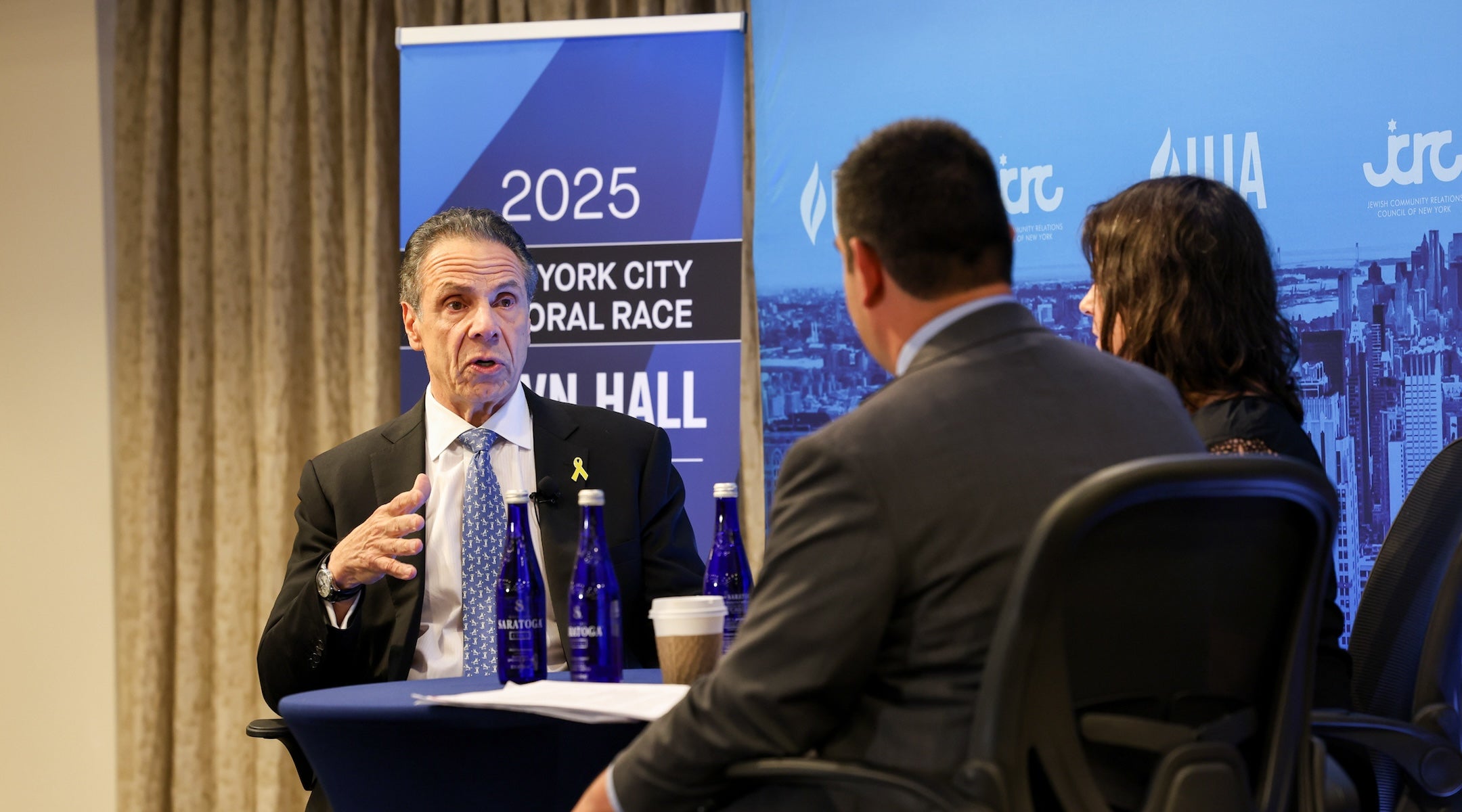
Andrew Cuomo speaks at the town hall hosted by UJA-Federation of New York and the Jewish Community Relations Council, in Midtown Manhattan, May 22, 2025. (Michael Priest Photography)
Clashing with Jews
Cuomo cultivated strong ties with Jewish leaders while he was governor, but some of those relationships hit rocky periods.
During the COVID-19 pandemic in 2020, Cuomo restricted gatherings and closed schools in Orthodox Jewish neighborhoods. He singled the community out for spreading infections “because of their religious practices” during a press conference, setting off street demonstrations among Orthodox Jews in Brooklyn.
In response to the order limiting religious gatherings, Agudath Israel of America, which represents Haredi Orthodox Jews, filed a federal lawsuit claiming their civil and religious liberties were violated. Agdath won the suit in a 5-4 ruling by the U.S. Supreme Court.
Cuomo also came under fire for allegedly disparaging an event celebrating Sukkot, when Jews gather under temporary huts often covered in tree branches, during his campaign for attorney general in 2006. He commented to his team, “These people and their f***ing tree houses,” according to The New York Times Magazine. His spokesperson denied the incident.
His friendship with Jews was also deeply tested by the sexual misconduct probe that toppled his governorship in 2021. A slew of Jewish Democrats called for his resignation, including party leaders like Sen. Chuck Schumer and Rep. Jerry Nadler. So did several liberal and progressive Jewish groups, such as the New York Jewish Agenda and Jews For Racial & Economic Justice.
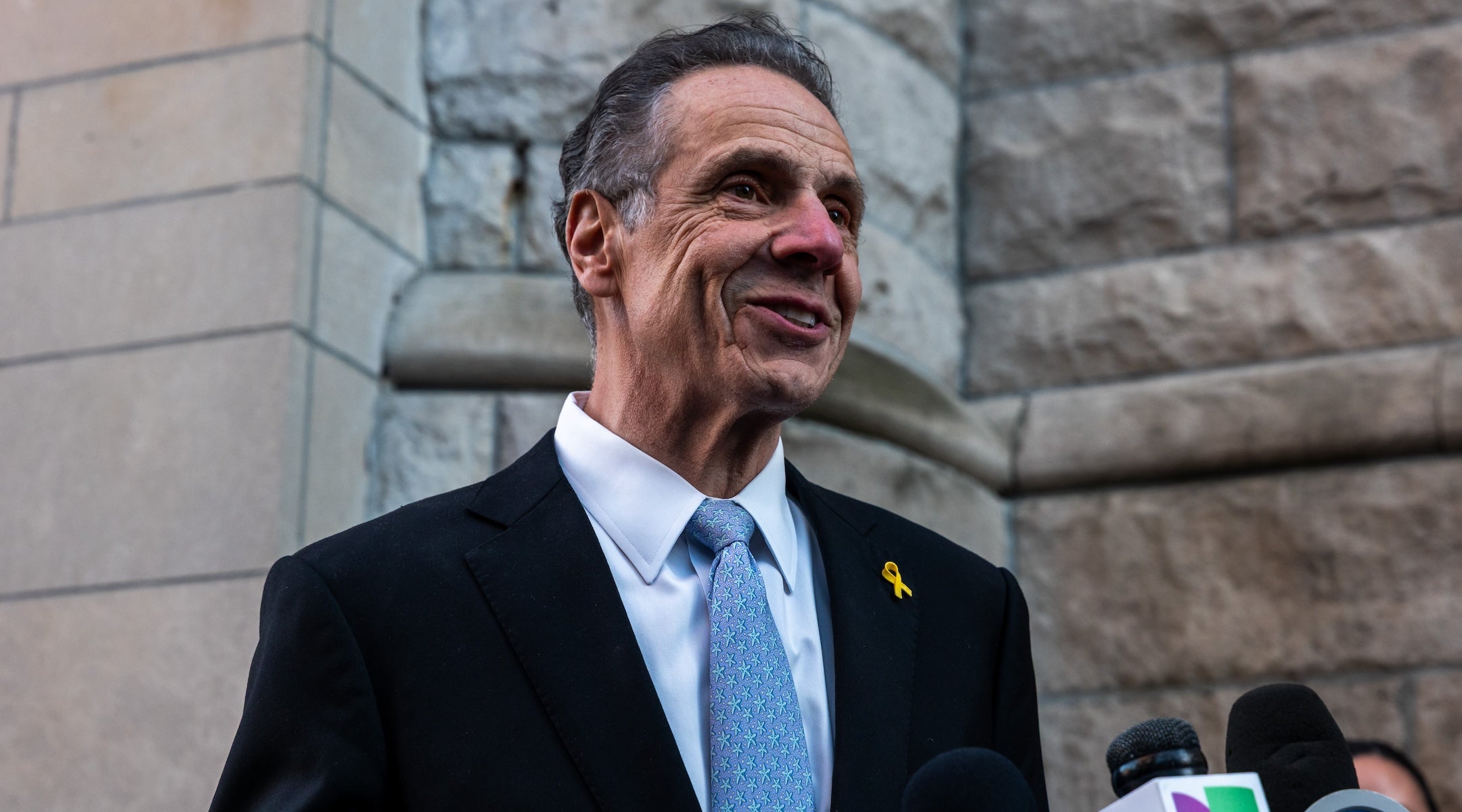
Andrew Cuomo speaks outside the West Side Institutional Synagogue, April 1, 2025, New York City. (Spencer Platt/Getty Images)
The Gaza war
Cuomo’s identification as one of Israel’s fiercest defenders has been complicated by the country’s increasingly unpopular war in Gaza.
Despite maintaining in September that he is “100% pro-Israel” and “the most aggressive governor in the country on behalf of Israel,” Cuomo now supplements his condemnations of Hamas with a call to end to the war that he indirectly acknowledges has devastated Gaza. His choice of words, referencing “the carnage every night on TV” and “horrific” violence, could be interpreted as sympathetic to the deaths of more than 66,000 Palestinians — though he never directly names them.
Cuomo has also placed more distance between himself and Netanyahu, whom he once sought to represent in court. “I never stood with Bibi,” he told The New York Times in September, saying that his legal argument was about the ICC’s jurisdiction and he had no alliance with the Israeli leader.
His shift in tone could reflect declining public opinion of Israel in the United States. Across the electorate, Quinnipiac polling shows an all-time low for sympathies with Israelis and an all-time high for sympathies with Palestinians. In New York City, a Times/Siena poll found that voters preferred Mamdani’s stance on the Israeli-Palestinian conflict over any other candidate’s by a wide margin.
Still, Cuomo has not explicitly criticized Israel’s conduct. After appearing to say in August that he did not support “what the Israel government is doing vis-à-vis Gaza” and “Israel impeding humanitarian aid,” he quickly backed off. He was simply “airing what some people feel,” not giving his own personal opinion, he clarified to The New York Times.
In a recent interview with The Forward, Cuomo said his position on Israel “hasn’t shifted one iota.”
“We want three things: We want killing to stop, because it’s a matter of humanity. We want the hostages returned, and Hamas eliminated,” he said. “If you don’t eliminate Hamas, you accomplish nothing. This will happen again and again.” That, he added, was “the same thing that Israel wants.”
—
The post Andrew Cuomo said antisemitism was his ‘most important issue.’ What does his record say? appeared first on Jewish Telegraphic Agency.
Uncategorized
Bari Weiss, Free Press founder who started as antisemitism crusader, named editor-in-chief of CBS
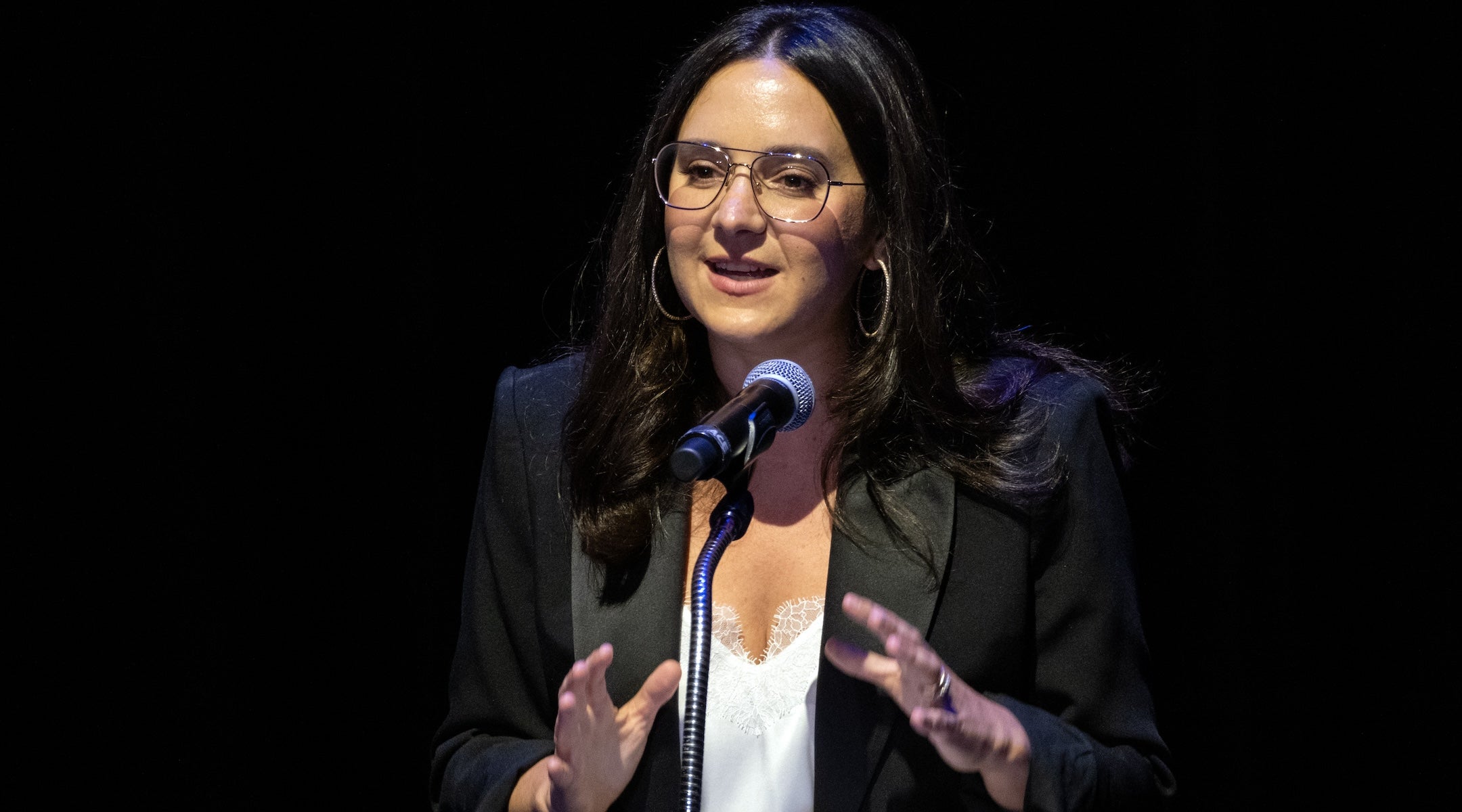
(JTA) — Bari Weiss, the journalist who first rose to prominence for her campus campaign alleging antisemitism two decades ago, has been named editor-in-chief of CBS News, a stunning ascent that marks one of the most consequential appointments in American media in recent years.
The appointment came as Paramount Skydance, led by David Ellison, announced its $150 million purchase of The Free Press, the publication Weiss founded in 2022. Weiss will oversee both outlets as editor-in-chief, reporting directly to Ellison. The move marks a major shakeup for a legacy news division long associated with mainstream liberalism and a bet on Weiss’s brand of provocative centrism.
Ellison’s involvement adds another layer of intrigue. The son of Larry Ellison, the Oracle founder known for his pro-Israel philanthropy, David has in recent months gained attention as his father helped spearhead a bid to acquire TikTok’s U.S. operations. The forced sale, mandated by a new U.S. law aimed at separating the platform from its Chinese ownership, has drawn political scrutiny and elevated the Ellisons’ influence at the intersection of media, tech, and geopolitics.
For Jewish observers, Weiss’s trajectory carries special resonance. Her public identity has long intertwined with Jewish causes, Israel advocacy and debates over antisemitism and free speech. Under her leadership, The Free Press has become a prominent voice on the American Jewish experience, particularly its coverage and commentary supporting Israel and condemning rising anti-Israel activism after Hamas’ Oct. 7, 2023, attack on southern Israel.
Born in Pittsburgh and educated at Columbia University, Weiss first emerged as a student activist in the early 2000s when she campaigned against professors she accused of anti-Israel bias, a battle that foreshadowed later campus wars over Zionism and academic freedom. A film she co-produced called “Columbia Unbecoming” documents her account.
Raised in a Reform Jewish household in the Squirrel Hill neighborhood, her connection to the community became national news with the 2018 shooting at the Tree of Life synagogue, the congregation where she had her bat mitzvah. The massacre, she wrote, was an “alarm bell” that shook her out of a “holiday from history.” She channeled the tragedy into a book, “How to Fight Anti-Semitism,” in 2019.
Now 41, Weiss has positioned herself as a defender of open inquiry within liberal institutions and a critic of what she saw as left-wing intolerance. She rose through the editorial ranks at The Wall Street Journal and The New York Times, where she became known for her critiques of “cancel culture.” Her 2020 resignation letter from the Times, alleging bullying and ideological conformity, went viral and turned her into a hero for many self-described centrists.
When she launched The Free Press, Weiss promised to create a home for “free thought and fearless reporting.” The site quickly grew into a digital media powerhouse, attracting major investors and millions of readers, but also attracting criticism from those who say Weiss’s project is a polished rebranding of right-wing media.
Now she will have the chance to bring her brand of journalism to a much broader audience, as the top editor overseeing coverage at a legacy news organization whose properties include “60 Minutes” and “Sunday Morning.”
“As proud as we are of the 1.5 million subscribers who have joined under the banner of The Free Press — and we are astonished at that number — this is a country with 340 million people. We want our work to reach more of them, as quickly as possible,” Weiss wrote in a letter to readers on Monday. “This once-in-a-lifetime opportunity allows us to do that.”
The post Bari Weiss, Free Press founder who started as antisemitism crusader, named editor-in-chief of CBS appeared first on The Forward.
Uncategorized
On Paramount+, Apple TV, HBO and more, Oct. 7 emerges as a cinematic subgenre
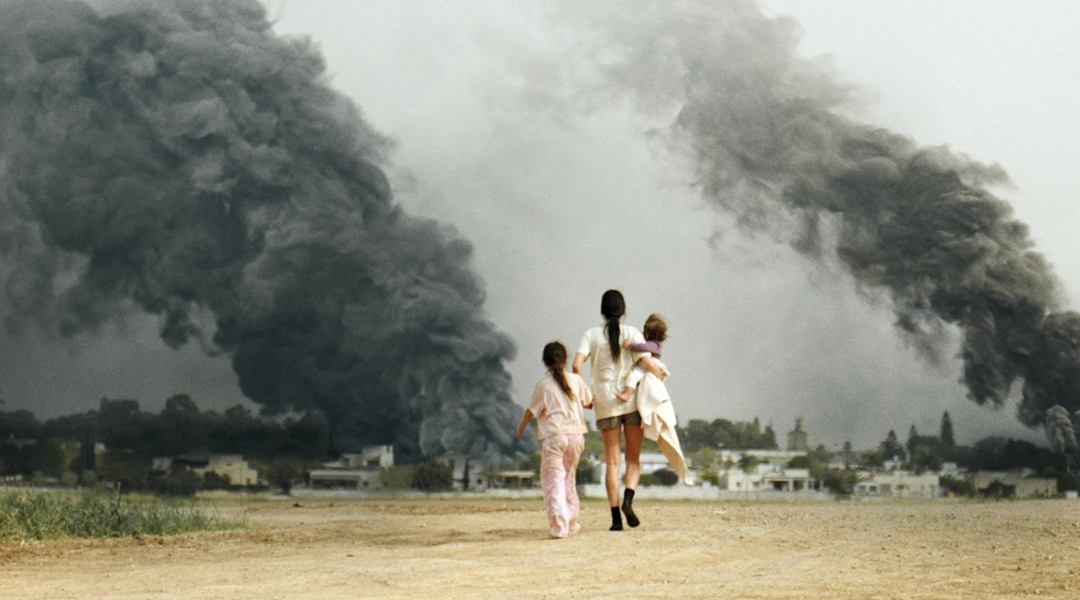
(JTA) — Two years after the Hamas attacks on Israel, the tragedy of Oct. 7 has become its own cinematic sub-genre. Filmmakers have rushed to bear witness, survivors have taken up cameras, and streaming platforms are now filled with documentaries and dramatizations that revisit, reimagine, and attempt to process the day’s horrors.
From raw documentaries of the Nova music festival to scripted miniseries debuting this month, these works show how Israelis, and Jews around the world, are still grappling with a single day that reshaped their lives.
The desert rave that became the site of mass murder has inspired a cluster of films, each offering a different register of witness.
“We Will Dance Again” is a documentary that offers a chronological, minute-by-minute account of the Oct. 7, 2023, Hamas attack on the Supernova Music Festival in Israel. The film is constructed primarily through the first-hand testimonies of over a dozen survivors, interweaving their accounts with footage they recorded on their cell phones and video recovered from the cameras of the attackers. The documentary is available to stream Paramount+.
“#Nova,” now on Prime Video, adds new layers of forensic detail by synchronizing video captured by the victims on their personal cell phones with footage recovered from Hamas body-worn cameras. “Supernova: The Music Festival Massacre,” on Apple TV and YouTube, stitches together real-time footage and interviews to convey the disorienting chaos of the first hours.
A more intimate companion piece, “Tattooed for Life,” which played across many film festivals but is not currently streaming, follows tattoo artist and survivor Liraz Uliel as she memorializes fellow festival-goers through a shared fractal tattoo design, an act of mourning turned into community ritual.
Other filmmakers have turned their attention to what happened in the homes, fields and kibbutzim of southern Israel.
The PBS documentary “After October 7: A Personal Journey to Kfar Aza” offers a close look at one of the hardest-hit communities, combining news footage with deeply personal reflections on grief, displacement and rebuilding.
Currently in theaters, “The Road Between Us: The Ultimate Rescue” chronicles retired general Noam Tibon’s desperate drive south to save his son, journalist Amir Tibon, and his family. Blending firsthand testimony with security footage of real-time chaos, the film recounts the former general’s 10-hour, high-stakes mission across a country under siege to rescue his loved ones from their home in Kibbutz Nahal Oz. The film won the People’s Choice Award when it premiered at the Toronto International Film Festival after some turmoil.
Two scripted productions expand these same themes. “Red Alert” (known in Hebrew as “First Light”) is a four-part miniseries that dramatizes five intertwined true stories of civilians, police, and first responders, and is executive-produced by Lawrence Bender, of “Pulp Fiction” fame. The series weaves these chaotic narratives together in a race-against-time format and premieres on Paramount+ on Oct. 7, making it one of two major scripted series to debut on the second anniversary of the attack.
The second series, “One Day in October,” an anthology series based on seven distinct personal stories, will debut on HBO Max on Oct. 7, with all seven episodes available for the U.S. audience.
Many documentaries are meant as a bulwark against denial.
“Bearing Witness to the October 7th Massacre,” a 47-minute film, compiled by the Israeli military, compiles raw footage from multiple sources, including Hamas body-cam recordings, dash cams, CCTV, and victims’ phone videos, to create a chronological record of the atrocities. Due to its graphic nature, the film has not been released to the general public and is only shown in private, invitation-only screenings for policymakers, journalists, diplomats, and community leaders around the world.
A documentary created by Sheryl Sandberg, “Screams before Silence,” address the sexual violence and gender-based atrocities perpetrated by Hamas during the attacks. It is intended to break what critics have described as a moral silence on these war crimes and is streaming on YouTube.
“The Killing Roads” does narrow its focus to the attacks on Route 232 and Highway 34, which were the main arteries where Hamas gunmen ambushed and killed approximately 250 people fleeing the Nova festival and surrounding communities. The film has been released for free viewing on platforms like YouTube and a dedicated website to combat denial of the massacre.
The PBS documentary “October 7th: Through Their Eyes” is focused on a network of Israeli volunteer archivists who immediately set out to preserve the large volume of digital evidence, including social media posts, videos, and messages, from survivors and victims before the content could be deleted or lost. The goal of their project, October7.org, is to create a widely accessible, permanent database of first-hand testimonies.
Several recent works focus on the ordeal of captivity and survival.
“The Children of October 7,” streaming on Paramount+ and hosted by activist Montana Tucker, profiles eight young survivors (ages 11-17) who share harrowing, unscripted testimonies of narrowly escaping death, witnessing the murder of family members, or enduring captivity, and highlights their resilience in the face of unspeakable loss.
Meanwhile, the short documentary “A Letter to David” sees the filmmaker revisit his onetime actor and friend, David Cunio, who remains held in Gaza along with his brother, Ariel Cunio, after being kidnapped from Kibbutz Nir Oz. The film is a collage of family footage and archival material that functions as a cinematic plea for his return.
As the shockwaves of Oct. 7 spread around the world, another crop of films has examined how the attacks reverberated across the Jewish Diaspora and within movements for and against Israel’s war.
The documentary “October 8” (previously titled “October H8te”) captures the anti-Israel protests that erupted across U.S. cities and college campuses in the days and weeks following the attack. It is streaming on Apple TV and Amazon. “The New Jew: Days of War” follows Israeli comedian Guri Alfi as he travels across North America to explore Jewish identity and division in the aftermath.
“Torn: The Israel-Palestine Poster War on NYC Streets” documents the dueling “Kidnapped” and “Free Gaza” posters that turned city lampposts into symbolic battlefields. And “There Is Another Way” portrays the Israeli–Palestinian group Combatants for Peace, whose members struggle to uphold their belief in nonviolence even as both societies harden in grief.
The post On Paramount+, Apple TV, HBO and more, Oct. 7 emerges as a cinematic subgenre appeared first on The Forward.
Uncategorized
Poll: 40% of American Jews believe Israel is committing genocide in Gaza
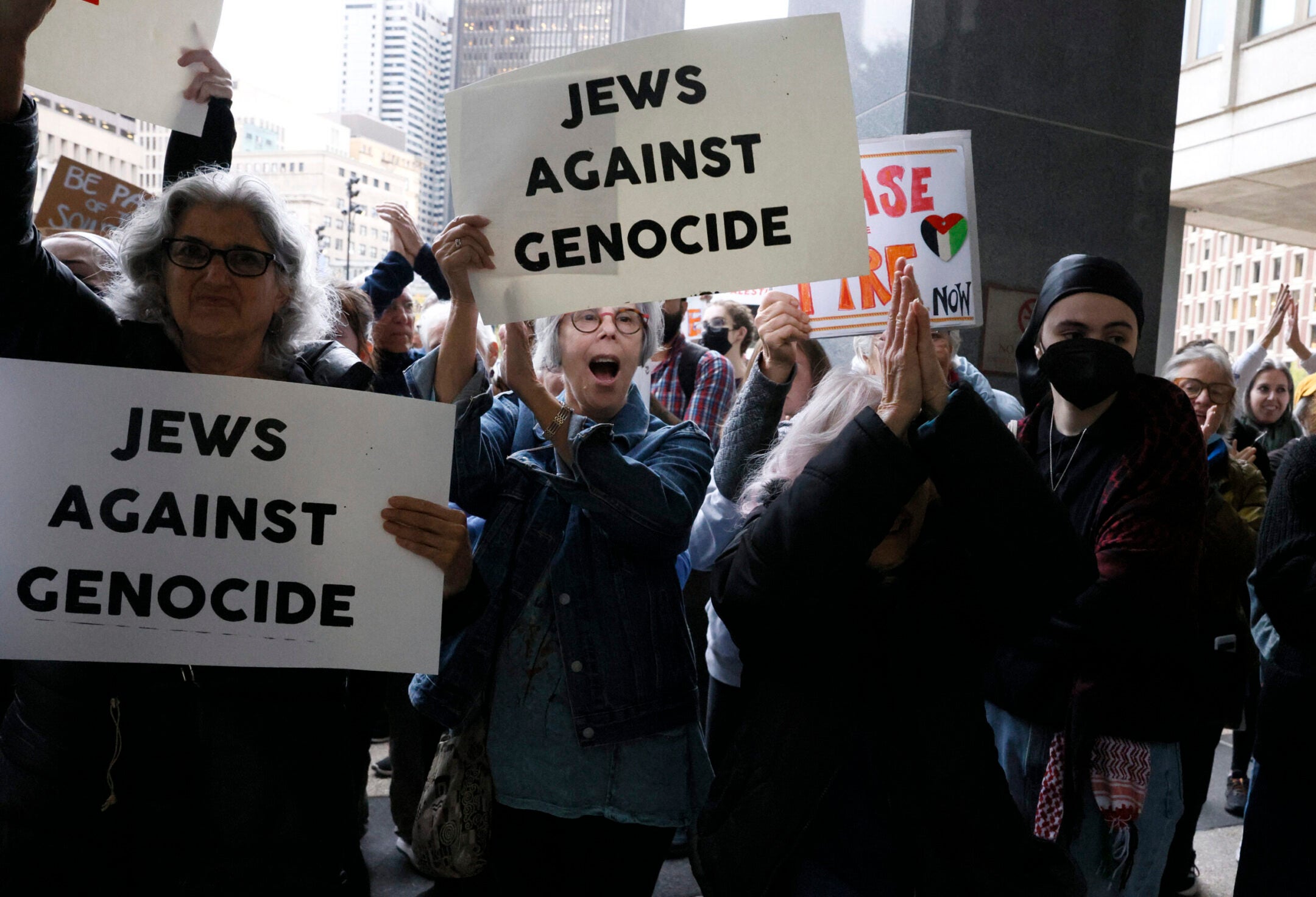
(JTA) — Multiple polls have found that about 60% of Americans believe Israel is committing genocide in Gaza, a biting charge that Israel and the United States reject.
Now, for the first time, a poll has taken the pulse of U.S. Jews specifically — and found that 39% of them hold the opinion.
The new poll by the Washington Post, conducted in early September prior to President Donald Trump’s latest breakthrough in ceasefire negotiations between Israel and Hamas, also found that 61% of American Jews said that Israel has committed war crimes against Palestinians.
While allegations that Israel is committing a genocide in Gaza have been lodged against the country by international bodies, human rights groups and pro-Palestinian activists, the poll suggests that charge is now resonating more widely among even U.S. Jews — those who are most likely to have a personal connection to Israel.
The poll found that many American Jews still hold strong ties to Israel. Three-quarters of American Jews surveyed said that Israel’s existence is vital for the long-term future of the Jewish people, while over half said that they were “very” or “somewhat” emotionally attached to Israel.
But emotional ties to Israel were far weaker among younger respondents. While 68% of American Jews over 65 said they were emotionally connection to Israel, among those aged between 18 to 34, that share dropped to 36%. Younger Jews were also more likely to call Israel’s actions in Gaza a genocide, with half of Jews aged 18 to 34 using the term.
The poll found that Jews were almost evenly split over Israel’s actions in Gaza, with 46% approving and 48% opposing. That divide was also split sharply on partisan lines, with 85% of Jewish Republicans approving compared to 31% of Jewish Democrats.
The majority of American Jews also blame Hamas more than Israel for the civilian death toll in Gaza, with two-thirds of American Jews blaming Hamas for starting the war and operating in civilian areas of Gaza, according to the poll.
The poll also found that criticism of Israeli Prime Minister Benjamin Netanyahu had significantly increased among American Jews in recent years. It found that 68% expressed a negative opinion of the Israeli leader, with 48% rating his leadership as “poor,” compared to 54% disapproving of him in a 2020 Pew Research Center poll.
On the continuation of the conflict between Hamas and Israel, vast majorities of the American Jewish community assigned blame to both Hamas and Netanyahu, with 91% saying Hamas bears responsibility and 86% saying Netanyahu bears responsibility.
As several European countries recognized Palestinian statehood last month, the poll also found that over half of American Jews believe that Israel and an independent Palestinian state can coexist peacefully with each other.
Looking to the relationship between the United States and Israel, about half of respondents said that U.S. support for Israel is at about the right level. A third of respondents said that the United States is too supportive of Israel, a share that jumped 10 percentage points since the 2020 Pew poll, and 20% said it is not supportive enough.
The Washington Post poll surveyed 815 American Jews from Sept. 2 to 9 and had a margin of error of 4.7 percentage points.
The post Poll: 40% of American Jews believe Israel is committing genocide in Gaza appeared first on The Forward.


